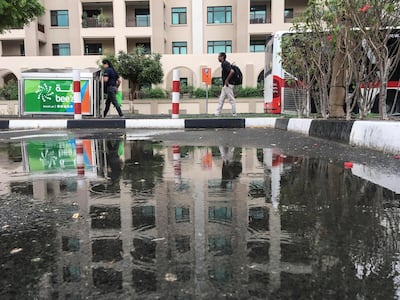“The worst weather ever,” said one. “I can’t believe I washed my car last night,” foamed another. “Will this weather ever end?” a third person moaned.
Breathless chatter about the UAE’s co-called “bad weather” has dominated offices, homes and countless social media channels over the past few months.
True, this has been one of the more seasonal winters of late featuring hail, rain, dust, thunder and lightning – and more is predicted today and tomorrow. But unpredictable weather is a feature of life here. Take 2016, when a huge storm swept through the UAE or November 2018, when rain and winds forced Louvre Abu Dhabi to cancel a gig by pop star Dua Lipa.
But if you think the past few days have been bad, spare a thought for those living here during the 1980s when water inundated the city.
Peter Hellyer, a consultant specialising in the UAE’s history, recalls heavy flooding in 1982 particularly.
“Low-lying areas of Abu Dhabi city set away from the main roads were flooded for weeks,” he said. “The internal roads in much of what was then called the Tourist Club area had not been completed and residents living there nicknamed it the ‘Lake District’.”
The city in 1982 was in the middle of a building boom, proper drainage was being developed and people had to get creative to reach their apartments.
“In parts of Khalidiyah, the water was so deep that, for a while, some people used little boats to row between their buildings and where they had parked their cars,” said Mr Hellyer. “That's an urban legend now - but it happened.”
Rain, of course, is not considered bad weather here. In a country with diminishing underground water reserves, a prayer for rain and an annual average rainfall of about 100mm - just 46.46mm fell in 2018 - we need every drop we can get.

But how much rain fell across the country during the 1980s is hard to quantify.
The lack of historical data is an issue as UAE-wide figures were only kept from the mid-2000s.
But Sharjah Airport is the exception. Records there date back to the mid-1930s when the airfield first opened as a British airforce base.
In 1982, at least 272mm of rain fell at the airport, according to data in Tribulus, the journal of the Emirates Natural History Group. Past years were even wetter. Take 1957, when a staggering 345mm of water fell at the airfield.
How does this compare today? Full figures have not been released this year but the highest ever monthly rainfall recorded by the National Centre of Meteorology since it started records in 2003 was 189mm at Razeen in the Abu Dhabi desert in April that same year. The highest monthly rainfall recorded so far this year was 86.4mm in March so 2019 cannot be described as the worst on record just yet.
Archive reports and photographs of the wild weather that hit the country in 1982 show parts of the Abu Dhabi Corniche flooded, damaged cars and huge standing pools of water in the main streets.

“Much of the land around buildings in areas such as the Tourist Club was still sand and so it was a quagmire,” said UK resident Richard Thompson, who arrived in Abu Dhabi in 1981 and remembers the 1982 floods.
“You got your feet wet and muddy, while cars got stuck as they went into holes in the sand you couldn’t see.”
Mr Thompson also remembers issues with mosquitos because of so much standing water. “Mosquito bite cream sales boomed,” he said.
So wet winters, dust and strong winds are the norm, not the exception over the longer term. And for anyone thinking the current bout of weather is unusual, perhaps say a quiet thank you that you don’t have to use a kayak to get into your building.


